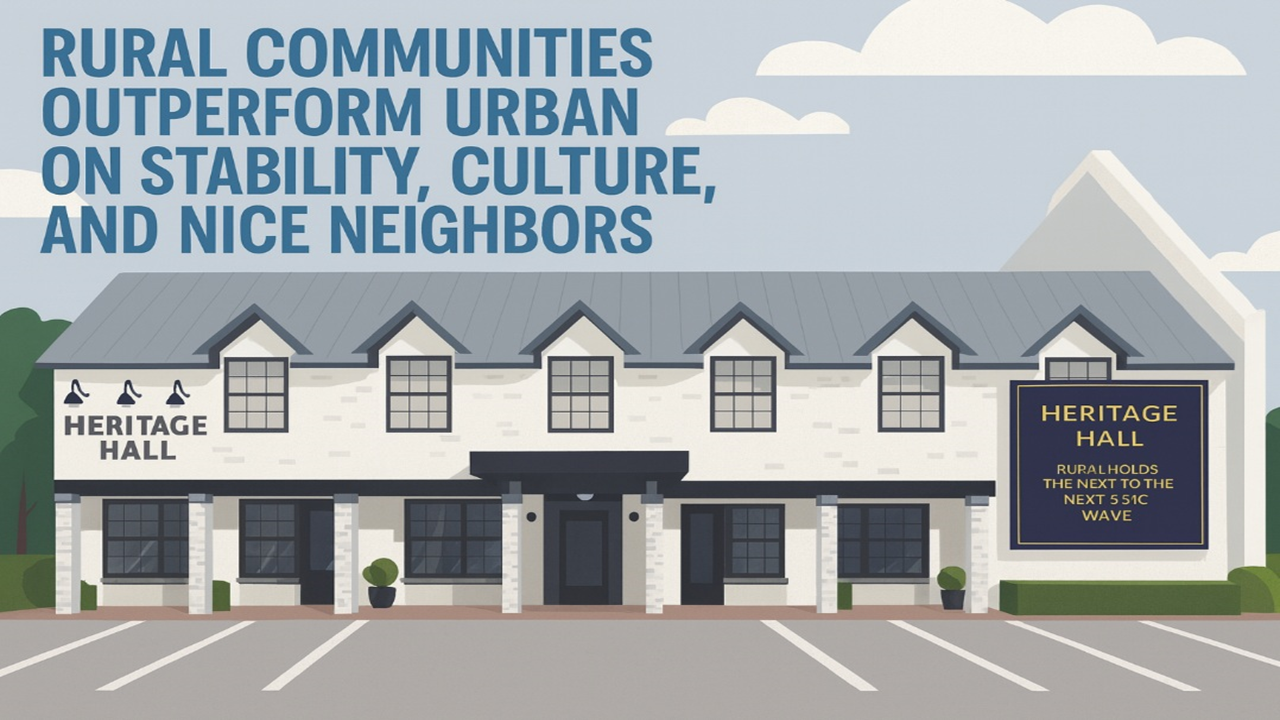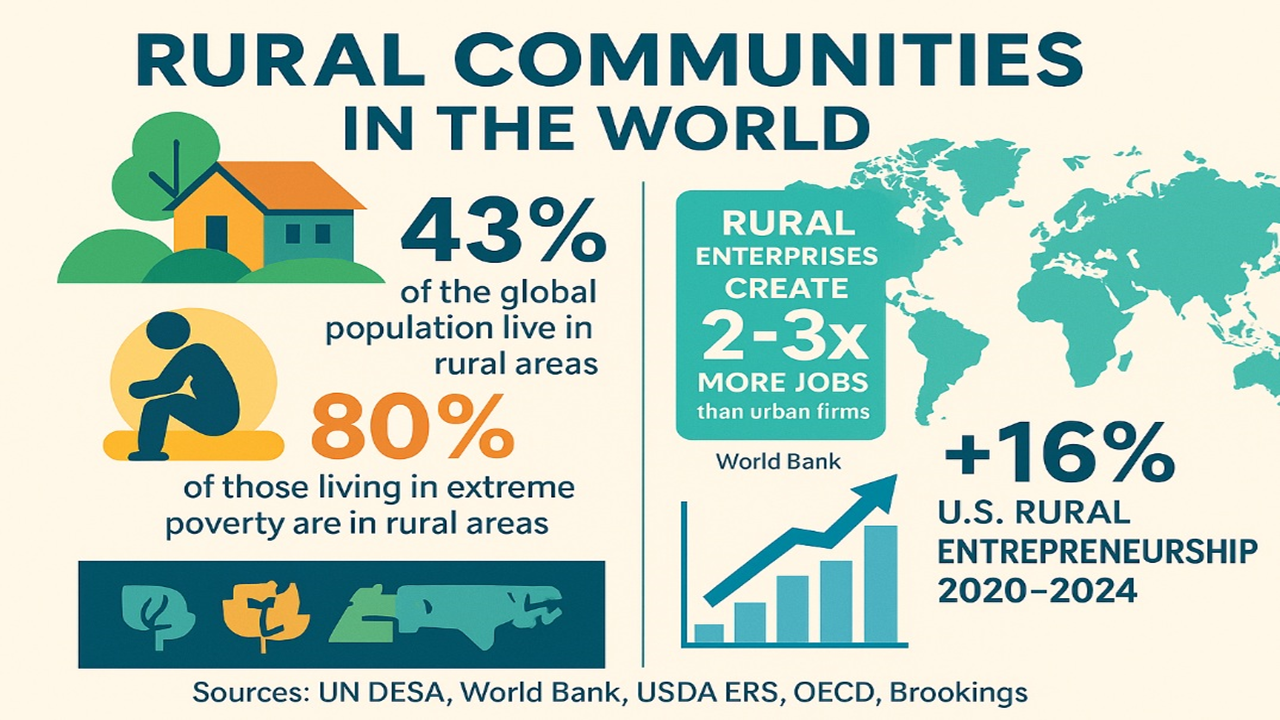
From Distress to Distinguished: How Economist Elena Korol Revitalized Heritage Hall into a Global Model for Rural Development and Sustainable Growth
Stuart, Florida – October 22, 2025. In a remarkable demonstration of economic vision and practical innovation, economist Elena Korol has transformed Heritage Hall, a once-distressed property in Stuart, Florida, into a thriving hub of over 30 medical, wellness, and service businesses. What began as a fading complex on the brink of foreclosure is now a global case study in rural revitalization, proving that small-scale, community-driven ecosystems can redefine economic growth in the 21st century.
A Vision for Rural Renaissance
For decades, global economic focus has centered on urban centers; skyscrapers, tech hubs, and sprawling metropolises. Yet, as cities reach saturation, rural areas are emerging as the next frontier for sustainable development. According to the United Nations Department of Economic and Social Affairs (UN DESA), 43% of the world’s population resides in rural regions, which account for 80% of global extreme poverty but also some of the fastest-growing entrepreneurial rates. The World Bank (2023) reports that rural investments generate two to three times more local employment than equivalent urban projects. In the United States, the U.S. Department of Agriculture’s Economic Research Service (USDA ERS) notes a 16% rise in rural entrepreneurship between 2020 and 2024, reversing decades of decline. As McKinsey & Company (2023) recently highlighted, rural regions represent the most underutilized growth opportunity of the coming decade.
Elena Korol saw this potential when she first stepped into Heritage Hall. Where others saw broken walls and empty offices, she envisioned a laboratory for economic and social renewal, a real-world application of sustainable development principles.
Heritage Hall: From Distress to Distinguished
When Ms. Korol assumed leadership of Heritage Hall, the complex was half-occupied and financially unsustainable. Within two years, her strategic interventions delivered transformative results:
- Rental income quadrupled, reflecting robust demand for affordable, compliant business spaces.
- Property value doubled, turning a distressed asset into a cornerstone of local prosperity.
- Over 30 licensed offices were brought into full medical and cosmetology compliance, creating a regional hub for professionals.

More than just numbers, Heritage Hall’s transformation lowered barriers for small businesses. By reducing average monthly rents from $1,200 to $750 and as low as $450 for community-service tenants like disability care providers and organic health specialists, Korol made it possible for local enterprises to serve low-income clients. Once described as having “more tumbleweeds than tenants,” Heritage Hall is now a vibrant micro-economy, connecting healthcare, wellness, and home improvement businesses in a shared, sustainable infrastructure.
A New Economic Model Rooted in Theory
Korol’s success is no accident; it is the practical application of her academic expertise. Her scholarly work, including the paper Bridging Theory and Practice: Applying Ostrom’s Law to Real-World Resource Management, draws on Nobel laureate Elinor Ostrom’s principles of collective governance. At Heritage Hall, tenants don’t just rent space, they participate in a self-governing ecosystem. Co-developed rules, transparent resource management, and collaborative leadership ensure fairness and stability. This real-world “commons” demonstrates that ethical governance can yield measurable economic and social returns, offering a replicable model for communities worldwide.
Why Rural Development Matters
Rural revitalization is no longer a niche concern, it’s a strategic imperative. The Organisation for Economic Co-operation and Development (OECD) now views rural innovation hubs as “critical engines of inclusive growth.” The Brookings Institution (2024) reports that rural counties accounted for over 25% of new U.S. business establishments in the past three years, the highest share since the 1990s. As one investor quipped, “Everyone rushed to the cloud. The next big thing? Dirt.” Local land, infrastructure, and small-scale business ecosystems are proving to be resilient, high-value assets in today’s economy.
Heritage Hall exemplifies this shift. By converting a distressed property into a self-sustaining business hub, Korol has shown how modest capital, transparent management, and community collaboration can unlock prosperity in small towns. The model’s success has drawn attention from development agencies and policymakers seeking scalable solutions for rural growth.
A Global Blueprint Unveiled
On October 11, 2025, at the 92nd Global Conference on Business Management and Economics (GCBME) at the University of Miami, Elena Korol and her daughter, co-author Sofiya Korol, presented Heritage Hall as a prototype for global rural development. Their keynote address emphasized the urgent need for North American investors to engage in Africa’s rapidly growing markets. Warning that China has already secured a commanding lead in African infrastructure and industrial development, Korol urged U.S. and Canadian stakeholders to act swiftly, building partnerships rooted in sustainability and shared governance.
Korol’s “Roll-Up Strategy” unifying small, fragmented assets into thriving, self-governed ecosystems, has proven effective at Heritage Hall and holds promise for global replication. “The same blueprint,” she noted, “can be scaled from Florida to Ghana to unlock inclusive prosperity.” By leveraging local resources and fostering community-driven governance, this approach offers a path to sustainable growth in rural areas worldwide.

A Call to Action
Heritage Hall is more than a revitalized building; it’s a testament to the power of rural communities to drive economic innovation. As global attention oscillates between Wall Street and Silicon Valley, Elena Korol’s work reminds us that the next economic revolution may emerge from community centers and once-forgotten properties. “Heritage Hall is not just a building,” Korol said. “It’s a blueprint for how rural and small communities can govern themselves back to prosperity.”
As rural regions gain recognition as the foundation of equitable global growth, Heritage Hall stands as a beacon of what’s possible when vision, theory, and action converge. Development agencies, investors, and policymakers are taking note, recognizing that the smartest investments may lie not in digital innovation alone but in rebuilding the local commons.
About Elena Korol
Elena Korol is an economist and thought leader in rural development and sustainable growth. Her work bridges academic theory and practical application, drawing on principles of collective governance to create scalable economic models. She is a frequent speaker at global conferences and a passionate advocate for inclusive prosperity.
Contact Information
For media inquiries or to learn more about Heritage Hall’s transformation, please contact:
Elena Korol
Classical Management LLC
Email: elena@heritagehall.info
